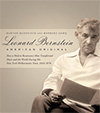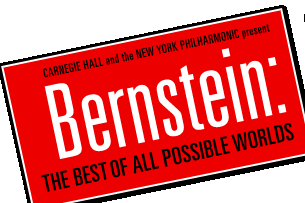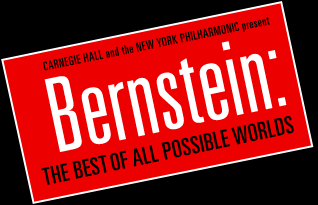
BERNSTEIN AT CARNEGIE HALL
- Leonard Bernstein
- Stage & Film
- Concert Music
- The Conductor
- The Educator
- The Social Activist
- Bernstein’s New York
- Bernstein and Faith
- Bernstein at Carnegie Hall
- Bernstein and the New York Philharmonic
- Bernstein Memory Bank
- Bernstein Timeline
Video
Burton Bernstein remembers his brother’s legendary Carnegie Hall debut.
© 2008 The Carnegie Hall Corporation.
Focus On
Leonard Bernstein at Carnegie Hall
Few artists have had as close an association with Carnegie Hall as Leonard Bernstein. Between 1943 and 1990, Bernstein appeared at the Hall more than 430 times in a multitude of roles including conductor, pianist, composer, and educator. Only a handful of musicians and ensembles have appeared at the Hall more often. Bernstein made his Carnegie Hall debut on November 14, 1943, substituting on a few hours’ notice for the ailing Bruno Walter and conducting—for the first time—the New York Philharmonic, where he had recently been appointed assistant conductor. The performance, broadcast nationwide on radio, received critical acclaim, and Bernstein was celebrated on the front page of the New York Times as the first American to conduct the Philharmonic.
Following this auspicious debut, Bernstein went on to conduct at Carnegie Hall throughout his life, leading not only the New York Philharmonic but also the Vienna Philharmonic, Israel Philharmonic, Boston Symphony, Philadelphia Orchestra, Cincinnati Symphony, American Composers Orchestra, Symphony of the Air, and Rochester Philharmonic. Highlights included Bernstein’s famous Young People’s Concerts with the New York Philharmonic, televised from 1958 to 1962; the 1976 Concert of the Century, which marked the 85th anniversary of the Hall’s opening and featured performances by Isaac Stern, Yehudi Menuhin, Mstislav Rostropovich, Vladimir Horowitz, and Dietrich Fischer-Dieskau; and the gala reopening of the Hall following its extensive renovation in 1986, at which Bernstein led the New York Philharmonic in his own Opening Prayer, the first Carnegie Hall commission.
Bernstein’s music has been performed at Carnegie Hall more than 700 times, including 11 premieres, from the New York premiere of his Symphony No. 1, “Jeremiah,” in March 1944 to the world premiere of the Symphonic Dances from West Side Story in February 1961. In addition, Bernstein accompanied such performers as mezzo-sopranos Christa Ludwig and Jennie Tourel and clarinetist Benny Goodman in recital, and was the featured soloist in piano concertos by Mozart, Beethoven, and Gershwin. Bernstein also appeared at many benefits at the Hall for a wide variety of organizations and causes, including ASCAP, the American Foundation for AIDS Research, the Carnegie Hall Endowment Campaign, America-Israel Cultural Foundation, United Jewish Appeal, Russian War Orphans, and the Musicians Foundation.
Support
Support Festivals at Carnegie Hall
Join Today! ![]()
Leonard Bernstein: American Original

By Burton Bernstein— former New Yorker writer and Leonard’s brother—and the New York Philharmonic’s historian, Barbara Haws.
Buy now ![]()
Related Events
© 2001–2008 Carnegie Hall Corporation
- Home
- |
- Multimedia
- |
- Press
- |
- Partners
- |
- Supporters





